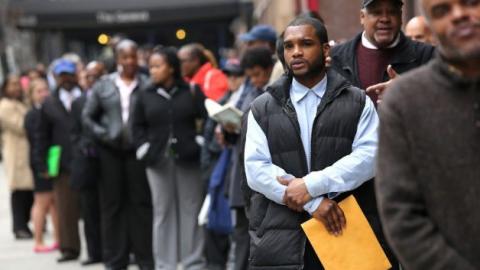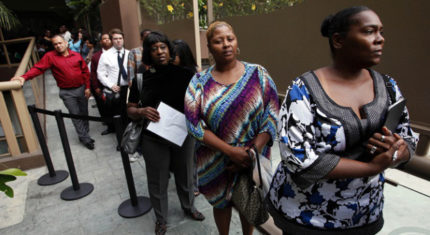
This lack of meaningful work not only affects their lives and future relationships, but it has a ripple effect on the entire Black community.
According to data compiled by the U.S. Department of Labor, more than 20 percent of Black people between the ages of 20 and 24 are unemployed and more than 30 percent of Black people between the ages of 18 and 19 are unemployed.
While the unemployment rates for Blacks has decreased since 2013, they are still disproportionately higher than the unemployment rates for other races of the same age.
Only 9 percent of white people between the ages of 20 and 24 are unemployed and less than 20 percent between the ages of 18 and 19 are unemployed.
With a flawed educational system sending young African-Americans out into the labor market unprepared for what they’ll find, experts believe the high unemployment rates serve as a sign that the younger generation continue to encounter age-old obstacles and other inefficient or racist systems that have never worked in their favor.
According to Joe Jones, the President and CEO of the Center for Urban Families, those systems include everything from the way the U.S. handles welfare and child support payments to the way the justice system has targeted young Black men for years.
Jones, who has spent years helping Black men become successful in the workforce, explained that Black men are facing an “educational crisis” and are not able to graduate from high school at significant rates, leaving them unprepared for the labor market.
“You have this graphic visual where you have young men who really care and want to do the right thing swimming upstream but coming downstream are all of these currents that they’re swimming upstream against that are preventing them from realistically ever being able to become successful on their own,” he said. “They find themselves literally out there on their own, isolated.”
According to the Washington Post, less than 70 percent of Black students graduated high school in 2012 while 86 percent of white students and 88 percent of Asian students graduated high school.
In addition to an educational system that has allowed Black students to slip through the cracks, the justice system is also coming “downstream” against young Blacks in the labor market.
“Structurally, I think there are a number of things that kind of ‘x’ African American men out of certain labor markets, particularly with the overrepresentation of African American men in the criminal justice system,” Jones continued. “That eliminates several opportunities.”
Jones explained that healthcare is one of the “growing sectors” that offers a significant amount of new jobs but many Black men can’t take advantage of these new positions.
Many jobs in health care are not open to people with criminal records.

Essentially, these systems lead to a vicious cycle that can keep young African Americans out of work and plague relationships and households throughout the Black community.
Several studies have listed financial issues as the leading cause of all divorces in the U.S., which means high unemployment rates lead to troubled relationships which leads directly to more divorces in the Black community.
Unfortunately, the cycle goes even deeper.
More divorces lead to more single parents and more Black men growing up without their fathers in the home.
“Not to mention the whole complexity around father absence in our country,” Jones said. “So many young men are growing up without fathers consistently involved in their lives, so as they go through these struggles they go through the struggles without the benefit of having somebody who brought them into the world to help them think through and work through these challenges.”
In the end, an alarming percentage of young Black children don’t receive the proper guidance they need to help them to excel in school and stay out of the streets. In some cases, young people have mentors who step in and fill the void. Many successful Black people have attributed their success to having mentors who were able to keep them focused in the classroom and out of trouble. Without such a figure, it is easier for Black youth to fall victim to failing educational systems and ultimately be left struggling to find employment.
This will likely lead to a repeat of the vicious cycle that has plagued the Black community for years and caused unemployment rates to remain high.
For many recent Black college graduates, these racist and flawed systems that keep them out of work eventually cause them to have doubts about the time and money they have invested in secondary education.
“I’ve worked so hard for a degree and made sure I’ve built relationships as well as built an amazing resume, so [to still be out of work] is discouraging,” said Camile Ervin, a 25-year-old Georgia State University graduate who has been faced with the harsh realities of post-graduation unemployment. “I understand it’s tough straight out of college but often times I don’t even get a response telling me the position has been filled. It’s almost as if I never applied.”
Moving forward, Ervin is focusing on finding the right mentor who can help give her the connections she needs to finally get the full-time position she’s been looking for.
“I’m continuing to network and build relationships,” Ervin said after explaining that for many successful Black graduates their connections were the key to getting a job. “I’ve also been looking at how certain companies and positions could link me to the job I really want later in the future.”


